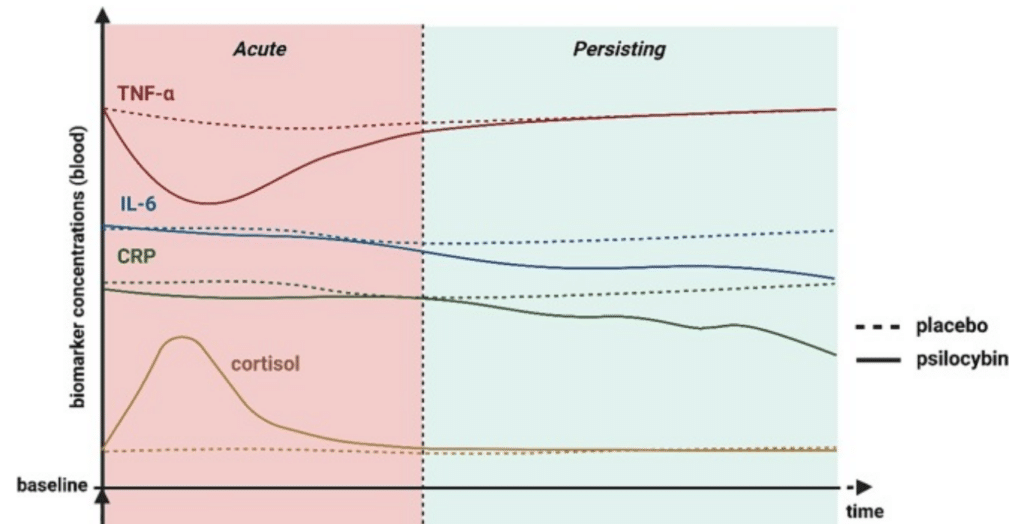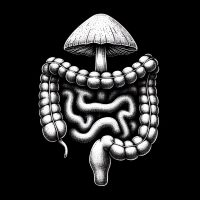Psilocybin and Crohn's
More and more scientific studies confirm that psilocybin works as an anti-inflammatory. Most natural treatments for Crohn's disease work because they have anti-inflammatory mechanisms. Can psilocybin, as an anti-inflammatory agent at the cellular level, mean something for people with Crohn's?
What is Crohn's disease?
Crohn's disease is a chronic inflammatory bowel disease that affects the digestive tract. This causes abdominal pain, diarrhea, fatigue, weight loss and malnutrition. The inflammation caused by Crohn's disease can affect any part of the digestive tract, from the mouth to the anus. These symptoms have a significant impact on patients' quality of life. Understanding the underlying causes and treatments of this condition is essential to finding a cure for this disease.
Possible causes
The causes of Crohn's disease are not yet fully known. However, scientific research has shown that factors such as heredity and a disturbed immune system probably play a role in the development of the disease. In addition, risk factors such as age, ethnicity, family history, smoking, use of anti-inflammatory medications, and certain environmental factors can contribute to the development of Crohn's disease. We do not yet know everything about this condition, but thanks to scientific studies we increasingly understand how the disease can manifest itself.
What we do know about Crohn's
Measurements have made it known which inflammatory products occur in high concentrations in Crohn's. These products include C-reactive protein, interleukin-6 and tumor necrosis factor-alpha. These measurements allow us to better understand the disease and develop targeted treatments that counteract these inflammatory products.
Does psilocybin have an anti-inflammatory effect on Crohn's?
According to various scientific studies, psilocybin can precisely reduce the inflammatory products that are increased in Crohn's. In theory, this seems like a solution to reduce the symptoms of Crohn's and get the disease under control. Below we indicate per topic whether psilocybin can have a positive influence on the inflammatory processes of Crohn's.

CRP
C-reactive protein remains reduced for a long time after using psilocybin.
There is some evidence to suggest that lowering C-reactive protein (CRP) levels may help treat Crohn's disease. Lowering CRP is an indication of reduced inflammation levels.
IL-6
Interleukin-6 is also permanently reduced after using psilocybin.
According to research, lowering IL-6 can reduce or worsen symptoms in people with Crohn's disease. For now it is unclear why this happens and more research is needed for a clear picture.
TNF-α
Tumor necrosis factor-alpha is reduced during use of psilocybin.
Lowering TNF-α can reduce inflammation and relieve symptoms such as abdominal pain, diarrhea and weight loss. Psilocybin reduces TNF-α mainly during use of high doses.
Cautious conclusion on the efficacy of psilocybin
Reducing inflammation in the intestines in Crohn's disease is seen as the best solution to combat the harmful effects of Crohn's. Psilocybin can reduce various inflammatory factors. Whether psilocybin therefore contributes to reducing Crohn's disease needs further investigation. For example, a previous study showed that blocking IL-6 alone could contribute to worsening of the disease, which may be due to the selective blockade of IL-6 alone. IL-6 plays a dual role by both inhibiting and promoting inflammation.
Of course, we cannot say with certainty whether it is wise to use psilocybin against Crohn's. We think that psilocybin will mainly have an anti-inflammatory effect in Crohn's, but more research will have to tell us more about its activity and safety.
What else can you do?
In addition to the use of psilocybin, there are many other things that have an anti-inflammatory effect and can therefore help with Crohn's disease. We hereby provide a list of tips against Crohn's.
In science, extracts or plant parts or herbs are used that have an anti-inflammatory effect on Crohn's disease. Below are a few with potential:
- Althaea officinales – True marshmallow
- Aloe vera/ferox (juice) – Normal or wild Aloe vera (juice)
- Artemisia absintium – absinthe balm
- Borago officinales (oil) – Borage or cucumber herb (borage oil)
- Boswellia serrata
- Cocos nucifera (oil) – coconut oil (extra virgin)
- Curcuma xanthorrhiza – Javanese turmeric root
- Echinacea purpurea – Coneflower
- Garcinia mangostana – Mangosteen or mangosteen
- Glycyrrhiza glabra – Licorice
- Hydrastis canadensis – Canadian turmeric
- Linum usitatissimum (oil) – Linseed oil
- Matricaria recutita – Real chamomile
- Morinda citrifolia – Noni or Indian mulberry
- Oenothera biennis (oil) – Middle evening primrose oil
- Panax ginseng – Korean ginseng
- Perilla frutecens (oil) – Black nettle oil
- Punica granatum (whole juice) – Pomegranate
- Plantago afra – Psyllium seed
- Plantago ovata – Psyllium seed
- Ribes nigrem (oil) – Black currant oil
- Saccharomyces cerevisiae subsp. boulardii – Yeast
- Ulmus rubra – Red elm
- Uncaria tomentosa – Cat's claw or Cat's claw
Krill oil
Krill oil works well against Crohn's disease because, like fish oil, it has an anti-inflammatory effect on the intestines and the rest of the body.
NAC
N-acetyl cysteine does not occur in our diet, but the body makes it from L-cysteine. N-acetyl cysteine can help with Crohn's disease because of its anti-inflammatory function and then supplementation is a solution.
The recommended dosage of N-acetyl cysteine (NAC) for Crohn's disease is 2000 mg per day divided into 2 or 3 doses. It is best to take it on an empty stomach with water.
Be careful with medication. N-acetyl cysteine (NAC) can increase the effect of antidepressants, nitroglycerin and anticoagulants. Consult your doctor first if you are taking medication.
Vitamin D
A lack of vitamin D is often forgotten, but plays a major role in the functioning of the immune system.
The following foods are pro-inflammatory and should be avoided in Crohn's disease:
Sugar: Eating sugar and especially fructose. Fructose together with glucose in a molecule is what we call table sugar. Avoid added sugar as much as possible. Sugar also causes inflammatory reactions in the body, causing less serotonin to be released.
Bad fats: Bad fats cause inflammatory reactions in the body, which reduces the release of serotonin and BDNF through inflammatory factors. The bad fats are usually vegetable omega 6 fats used for frying such as sunflower, soy and peanut oil. Hydrogenated (vegetable) fats are also bad fats. Do not heat fats until they start to smoke and preferably keep the temperature lower than 180C.
Dairy: Dairy can also have a pro-inflammatory effect when consumed at high levels. It is best not to consume sweetened or unacidified dairy products. Unsweetened kefir or yogurt can therefore be eaten in moderation.
Gluten: Eat as few grain-based products as possible. Gluten can also cause inflammation, especially in allergic reactions. Oats and therefore oatmeal can be eaten.
Alcohol: Alcohol is fermented sugar and is best avoided entirely. If alcohol is consumed, half to a full glass of wine per day can be drunk without too much damage. Above that, alcohol already becomes an inflammation promoter.
Meat: Game, grass-fed meat and wild fish are no problem provided that red meat is eaten in limited quantities (recommended maximum twice a week). Any fish that is not wild caught or fed differently than natural should not be eaten. Grain- and corn-fed animal products are also discouraged.
Although allergies are not the direct cause of the disease, they can contribute to the development and worsening of symptoms. Allergies can activate the immune system and cause inflammatory responses, which in turn can worsen inflammation in the gut in people with Crohn's.
Some studies have shown that people with Crohn's may have an increased sensitivity to certain foods, such as dairy products, gluten, and certain types of food additives. These foods can cause an allergic or inflammatory reaction in the intestines, which can worsen Crohn's symptoms.
In addition, allergies can also play an indirect role in Crohn's by disrupting the intestinal flora. Disrupted intestinal flora can lead to increased permeability of the intestinal wall, making it easier for allergens and other harmful substances to enter the bloodstream and cause inflammation.
It is therefore advisable to avoid allergic reactions as much as possible in case of Crohn's.
Stress can have a negative impact on the immune system and increase inflammatory responses in the body. Since Crohn's is an inflammatory disease, reducing stress may help reduce inflammation and improve Crohn's symptoms.
There are several ways to reduce stress, including regular exercise, relaxation techniques such as meditation or yoga, getting enough sleep, and avoiding triggers such as caffeine and alcohol. It is also important to eat a healthy diet rich in nutrients and fiber, and to drink enough water.
Reducing stress also reduces the risk of a “leaky gut” or increased permeability of the intestinal wall. When we are stressed, our body produces the stress hormone cortisol. Prolonged stress and elevated cortisol levels can cause inflammation in the body, including in the intestines. This inflammation can lead to damage to the intestinal wall and increased permeability, allowing unwanted substances such as bacteria, toxins and undigested food particles to enter the bloodstream.
A “leaky gut” can in turn lead to inflammatory responses in the body and can contribute to several health problems, including Crohn's disease.
Psilocybin therapy is known to reduce stress levels and can therefore also contribute to less chance of inflammation in the body.
Psilocybin session under supervision
Supervised psilocybin sessions generally work better because the therapist or counselor can support and guide you during the experience. We can help you explore your thoughts, emotions and experiences and can conduct conversations, offer guided meditations or use other techniques to help you gain insights and process any problems you may have. They also ensure your physical safety and we can help you with the preparation and integration of the session.
At Triptherapie we use a step-by-step plan for psilocybin sessions:
1. Registration: You can register without obligation via the intake form. Here you can indicate what you want to achieve with the session and mention any medical or psychological conditions.
2. Intake: After registration we will contact you to indicate whether a psychedelic session can take place in your case.
3. Advice: Based on the intake, we provide advice on nutrition, supplements and, if necessary, exercise advice. We can also provide tips to prepare for the session. Following this advice can improve the effect of the psilocybin session.
4. Monitoring: We will be in contact again about a week before the session to discuss the progress and effect of the advice. We can still decide to adjust the planning if necessary.
5. Psilocybin session: During the session you take a dose of psilocybin, usually in the form of magic truffles. Your supervisor of choice will guide and support you during the effect of the psilocybin. We can use different techniques to help you gain insights and process any problems.
6. Integration: After the session it is important to integrate the experience into your daily life. We offer support and guidance in this process, for example through conversations or assignments.
